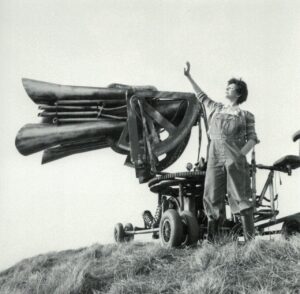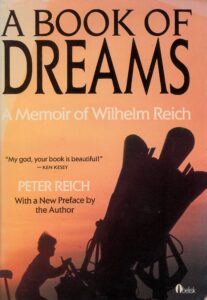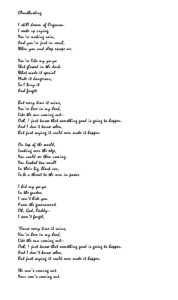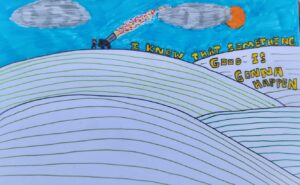Dear readers,
It hasn’t always been on my playlist. It has been a bit “out of ear, out of mind” over the years. It is now, though. According to Spotify, it was my third or fourth most listened to song in 2023. My mother would dance around the kitchen to it while preparing the Sunday roast, and I would sit at the kitchen table for mum to keep an eye on me, ensuring that I would, maybe, attempt to do my homework. I would hover around taking in the aromas of roast lamb, pork, beef or chicken with potatoes and veggies in the oven, but also in the hope mum would do my maths and business studies homework, because I didn’t have the spark or motivation for that nonsense, but I did for football, budgerigars, computer games and Oasis. Yes; regrettably, I was a lazy oik at school. English and PE were the subjects what I rolled out of bed for. Maths I hated, and it is still a weakness today. I miss crucial cognitive numerical problem-solving tools, mathematically dyslexic so to speak, meaning my calculator or Chat GPT to do the brain work, as it does for billions more humanoids these days. Robots are taking over. You’ve been warned.
 If my memory serves correct, the first time I heard the song was on a wintery afternoon. It was greyish and cold outside, and there was something on BBC Radio 4 with Kate Bush talking of her inspiration behind the song. I don’t remember if it was a Desert Island Discs episode, which I think usually aired on Sunday, but I remember mum being captivated by it and I was curious why. I can’t recall my age, but I guess I was still in junior school; anywhere between 7 and 11. But it was that afternoon I heard the song for the first time, and the looping orchestral rhythm of the “dum da da dum, da da dum, da da da da da dum…” which became a lifelong ear-worm that will happily echo in my mind until my death. The song comes and goes from my life, but it seems to return when I pass through a major life event. It certainly did so when my father passed away. The song certainly eased with the grieving process, as highlighted in one of my previous blog posts, A Game of Grief.
If my memory serves correct, the first time I heard the song was on a wintery afternoon. It was greyish and cold outside, and there was something on BBC Radio 4 with Kate Bush talking of her inspiration behind the song. I don’t remember if it was a Desert Island Discs episode, which I think usually aired on Sunday, but I remember mum being captivated by it and I was curious why. I can’t recall my age, but I guess I was still in junior school; anywhere between 7 and 11. But it was that afternoon I heard the song for the first time, and the looping orchestral rhythm of the “dum da da dum, da da dum, da da da da da dum…” which became a lifelong ear-worm that will happily echo in my mind until my death. The song comes and goes from my life, but it seems to return when I pass through a major life event. It certainly did so when my father passed away. The song certainly eased with the grieving process, as highlighted in one of my previous blog posts, A Game of Grief.
There is something very harmonic about the song. It is rich and varied, using lush chord voicings and harmonic progressions that create depth and complexity. There are extended chords, which I researched are in major 7ths and suspended chords, adding colour and texture to the song’s palette. Bush uses strings and synthesisers and percussions, along with her voice, to give the song a melodic texture, something atmospheric.
All these ingredients give Cloudbusting a strong emotional impact; it’s haunting. It is also storytelling, which I will come to shortly. The chorus and dramatic build-up convey a yearning, a connection, a transcendence, between the listener and the narrator.
Kate Bush reminds me of David Bowie, a real musical artist, mixing elements of pop, rock and avant- garde genres, with inventive lyrics and innovative production techniques. She was 19-years-old when she burst onto the scene with Wuthering Heights in the late 1970s, and she has retained a certain esteem among the masses and the music industry. Cloudbusting was released in 1985, but it has a timeless quality. It’s relevant today and is an inspiration amongst contemporary artists, thanks to the unconventional and catchy rhythm. Only great artists can do that: produce music, novels or portraits that are relevant for many generations. Kate Bush’s music is just that: evergreen. One of her other songs, Running Up That Hill, returned to the public ears a couple of years ago thanks to the Netflix show, Stranger Things, becoming a hit with younger generations for similar reasons: its evergreen pull.
 When I first heard the song, I admit, it wasn’t the lyrics that caught my attention, which is odd as words and narratives often hook me more than the music itself. As stated, it was the looping tempo: a lifelong earworm that I often nod my head in rhythm to as it plays out in my mind while working or waiting in a supermarket queue. I guess I was too immature to grasp the lyrics at the time. They are based on Peter Reich’s memoir, A Book of Dreams, about his father Wilhelm Reich, evoking themes of imagination, longing and the power of human spirit. My sister bought me the book for Christmas in 2022, and I gobbled it up by New Year’s Eve. It is an emotive read with a kind of “us against the world” narrative that Bush cleverly discloses in her lyrics to her song. It also focuses on a cloudbusting machine invented by Wilhelm that produced cloud formations and rain to arid areas using orgone energy, something as new to me as it is to you. I enjoyed the book. As stated, I ate it up in a week. My mum and sister also gifted me with a print of the song which is currently in storage in Malvern as I sort my life out.
When I first heard the song, I admit, it wasn’t the lyrics that caught my attention, which is odd as words and narratives often hook me more than the music itself. As stated, it was the looping tempo: a lifelong earworm that I often nod my head in rhythm to as it plays out in my mind while working or waiting in a supermarket queue. I guess I was too immature to grasp the lyrics at the time. They are based on Peter Reich’s memoir, A Book of Dreams, about his father Wilhelm Reich, evoking themes of imagination, longing and the power of human spirit. My sister bought me the book for Christmas in 2022, and I gobbled it up by New Year’s Eve. It is an emotive read with a kind of “us against the world” narrative that Bush cleverly discloses in her lyrics to her song. It also focuses on a cloudbusting machine invented by Wilhelm that produced cloud formations and rain to arid areas using orgone energy, something as new to me as it is to you. I enjoyed the book. As stated, I ate it up in a week. My mum and sister also gifted me with a print of the song which is currently in storage in Malvern as I sort my life out.
I can’t go on without a bit more context of Wilhelm Reich, an Austrian psychiatrist and psychoanalyst known for his controversial theories and contributions to science. Initially associated with Sigmund Freud, Reich developed the concept of “orgone energy,” presenting it as a universal life force found in all living organisms. He founded orgonomy, a branch of psychotherapy focused on orgone energy’s role in emotional and physical well-being, and created orgone accumulators for therapeutic purposes. Despite initial prominence, Reich’s work faced widespread criticism for lacking empirical evidence, leading to legal troubles with the U.S. FDA, which ultimately resulted in his imprisonment and death in 1957, which his son focuses on in the memoir, as does Bush in her song.
 Back to the lyrics: it is storytelling. So colourful and vibrant. They haunted me in the wake of my dad’s passing. They always will, though in a cathartic way. There are particular verses or lines that resonate and symbolise something about my dad. I guess we all do that with art: we personalise it, interpret it in different ways, relating it to different memories or people, to move us, inspire us or evolve us. I like the theory that once the artist has published their work, that piece of art no longer belongs to them (apart from in royalties and accreditation, of course). It’s not to say the artist’s original meaning or inspiration is no longer significant or relevant; of course, their explanation, context and insight is always important and interesting to know. However, after the art is unveiled, it belongs to the public, the reader, the listener, the admirer, the critic, the everyday man or woman, to interpret whatever they please from it. As William Shakespeare scripted in The Tempest, probably in a completely different context, “Thought is free”. My dad actually gifted me a t-shirt with this quote.
Back to the lyrics: it is storytelling. So colourful and vibrant. They haunted me in the wake of my dad’s passing. They always will, though in a cathartic way. There are particular verses or lines that resonate and symbolise something about my dad. I guess we all do that with art: we personalise it, interpret it in different ways, relating it to different memories or people, to move us, inspire us or evolve us. I like the theory that once the artist has published their work, that piece of art no longer belongs to them (apart from in royalties and accreditation, of course). It’s not to say the artist’s original meaning or inspiration is no longer significant or relevant; of course, their explanation, context and insight is always important and interesting to know. However, after the art is unveiled, it belongs to the public, the reader, the listener, the admirer, the critic, the everyday man or woman, to interpret whatever they please from it. As William Shakespeare scripted in The Tempest, probably in a completely different context, “Thought is free”. My dad actually gifted me a t-shirt with this quote.
Verse One
I still dream of Orgonon.
I wake up crying.
You’re making rain,
And you’re just in reach,
When you and sleep escape me.
The first verse reminds me of the first few nights after my dad passed. The lyrics read for themselves and are kind of self-explanatory and obvious. I remember the sleeplessness, shock and denial, finding it hard to digest, the feeling that the person is still alive and you can physically touch them and say hello and make them coffee or tea in the morning. Then you jolt awake in the night, realising that they are no longer in reach; the tears and sleep escape you.
The Chorus
But every time it rains,
You’re here in my head,
Like the sun coming out–
Ooh, I just know that something good is going to happen.
And I don’t know when,
But just saying it could even make it happen.
 My dad died in the midst of an English autumn when it was grey and it rained a lot of horridly cold and windy droplets. Still today, in Honduras when it’s grizzly, it reminds me of those days before my dad died, quite a dark period as you can imagine. The line “you’re here in my head” echoes in my head, over and over. Then the words turn to a lighter note, “like sun coming out” and “I just know that something good is going to happen” which evokes beautiful lasting memories of him. My dad’s company was fun and exciting: something fun was always around the corner.
My dad died in the midst of an English autumn when it was grey and it rained a lot of horridly cold and windy droplets. Still today, in Honduras when it’s grizzly, it reminds me of those days before my dad died, quite a dark period as you can imagine. The line “you’re here in my head” echoes in my head, over and over. Then the words turn to a lighter note, “like sun coming out” and “I just know that something good is going to happen” which evokes beautiful lasting memories of him. My dad’s company was fun and exciting: something fun was always around the corner.
Verse 2
On top of the world,
Looking over the edge,
You could see them coming.
You looked too small
In their big, black car,
To be a threat to the men in power.
Just months before my dad passed, I’d had wonderful career success with a promotion to a director position in my current workplace, so I pretty much was on top of the world. Without wanting to cliché the situation, but life waits for no one. “The big, black car” I metamorphosize into cancer. Enough said.
End of second pre-chorus
Oh, God, Daddy, I won’t forget
 On the face of it, the meaning seems explicit. I will never forget my dad. Kate Bush’s voice makes it very emotive. However, I read into the line on a slightly more cultural level and profound meaning, based on the Mexican tradition on Día de los Muertos, when families leave an ofrenda (offering) to the loved one’s spirits who have passed away, something they enjoyed when alive, such as a type of food or drink, along with a photo, candles, a crucifix and orange marigold flower petals that are sprinkled along the floor that leading to a door – a path for the spirit, I’m told. In the Disney movie Coco, a beautiful story which centres around the Day of the Dead traditions, spirits in the Land of the Dead cannot return to see loved ones on the day if their loved ones have forgotten them. In a peculiar way, I suppose this line – this song – is my ofrenda to my dad, to keep my memories of him alive, and so I can share a tipple with him every year on Día de los Muertos.
On the face of it, the meaning seems explicit. I will never forget my dad. Kate Bush’s voice makes it very emotive. However, I read into the line on a slightly more cultural level and profound meaning, based on the Mexican tradition on Día de los Muertos, when families leave an ofrenda (offering) to the loved one’s spirits who have passed away, something they enjoyed when alive, such as a type of food or drink, along with a photo, candles, a crucifix and orange marigold flower petals that are sprinkled along the floor that leading to a door – a path for the spirit, I’m told. In the Disney movie Coco, a beautiful story which centres around the Day of the Dead traditions, spirits in the Land of the Dead cannot return to see loved ones on the day if their loved ones have forgotten them. In a peculiar way, I suppose this line – this song – is my ofrenda to my dad, to keep my memories of him alive, and so I can share a tipple with him every year on Día de los Muertos.
So. As a call to action, are there any songs that resonate with you in such a way?
Let me know in the comments below.


Gracias por compartir tus reflexiones, creo que podría decir que a lo largo del tiempo he encontrado varias canciones que me han hecho reflexionar o que puedo relacionar con lo que estoy viviendo en ese momento.
Como por ejemplo Lucha de Gigantes de Nacha Pop, en la época en que falleció mi tío, realmente resonaba en mi cabeza la frase “en un mundo descomunal siento mi fragilidad”.
Gracis por compartir, Nubia. Voy a escucharlo ahorita!